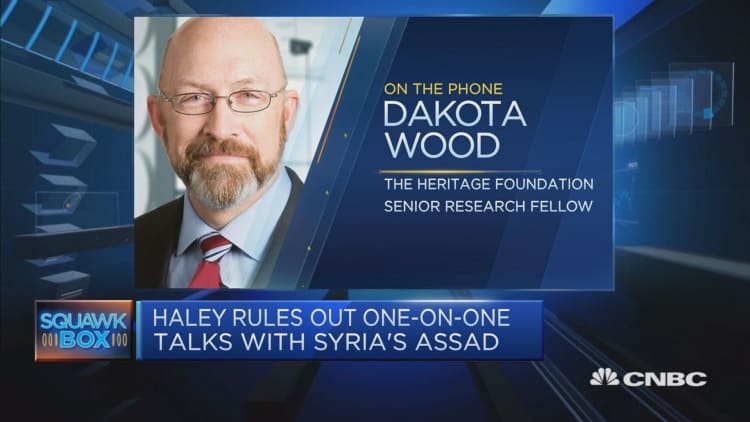U.S.-led airstrikes in over the weekend could benefit President Donald Trump during nuclear negotiations with North Korean ruler Kim Jong Un.
Saturday's missile attacks on Syrian chemical weapons facilities shows the world's largest economy possesses the military and the political will to back up warnings it makes, strategists told CNBC. That sends a message of resolve to Pyongyang, which was likely closely monitoring developments in the Arab nation, they argued.
The coordinated bombings by the United States, France and Britain were in response to Syrian President alleged use of chemical weapons — toxic agents, including chlorine gas, are said to have killed at least 70 people on April 7 in a city near Damascus. Assad's government denied any responsibility in the incident, but French intelligence indicated Syrian government forces executed the chemical attack.
The airstrikes are proof that the White House will back up talk with action, said Dakota Wood, a senior research fellow specializing in defense at conservative research group The Heritage Foundation.
Western powers drew a red line on the use of chemical weapons in Syria and they acted on that, so "if the U.S. now says that it will not tolerate North Korea's offensive nuclear capabilities, Kim's government will have to take that statement seriously and consider potential military consequences," Wood added.

The Pentagon says Saturday's airstrikes were a legitimate and proportionate response to Assad's continued use of fatal nerve agents. The episode is being called the biggest Western intervention in Syria's civil war since the conflict began in 2011.
"When our president draws a red line, our president enforces the red line," U.S. Ambassador to the United Nations Nikki Haley said on Saturday.
The Syria response "gives the U.S. more leverage in nuclear discussions with North Korea," said Andrea Taylor, a nonresident fellow at Washington-based think tank Atlantic Council. The move also increases "U.S. credibility in the eyes of countries across the world, whether it's Moscow, Tehran or Pyongyang," she added.
So, if Trump now makes any fresh threats to Kim's regime, the North won't be able to ignore them, Taylor said.
Trump's face-to-face meeting with Kim is expected to take place next month but few details have been disclosed about the historic sit-down.
Close ties between North Korea and Syria have long fanned fears of deeper cooperation on missile technology and chemical weapons. A United Nations report in March revealed that the North sent more than 40 previously unreported shipments related to prohibited ballistic missiles and conventional arms to Damascus during 2012 and 2017.
More than Syria, North Korea will be watching how Trump handles the Iran nuclear deal, said Graham Griffiths, senior analyst at Control Risks. The rogue state's mistrust of Washington could grow should the president pull out from the agreement, he said.

